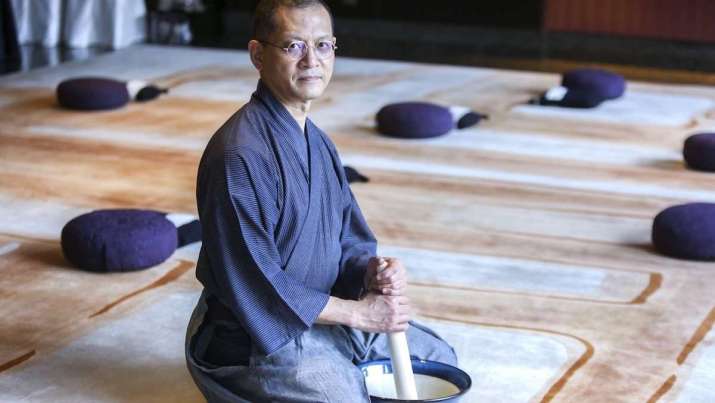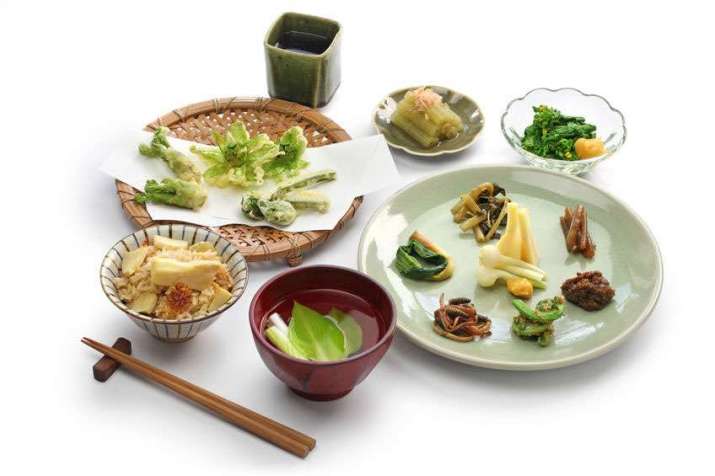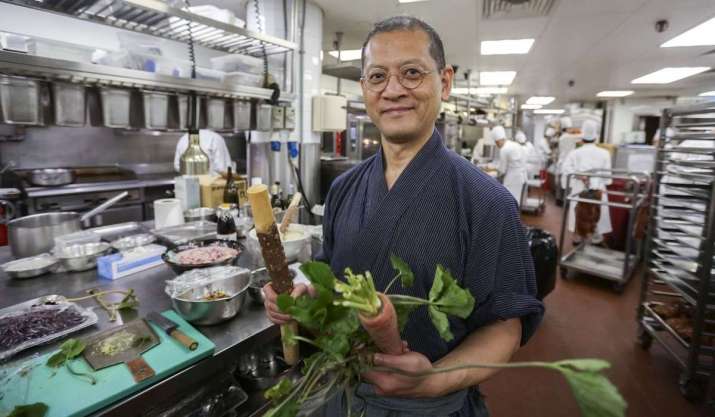NEWS
Japanese Chef Campaigns to Preserve and Share the Buddhist Dining Tradition of Shojin Ryori
 Toshio Tanahashi, Japanese salaryman-turned-mindful-chef. Photo by Xiaomei Chen. From scmp.com
Toshio Tanahashi, Japanese salaryman-turned-mindful-chef. Photo by Xiaomei Chen. From scmp.comToshio Tanahashi is no ordinary cook. The Japanese salaryman-turned-chef has a unique objective in his cooking that he learned from the Buddhist teachings. For Tanahashi, cooking is not business as usual in the kitchen of a restaurant, nor is it a simply means to make money. His sole purpose is to spread the cooking style of shojin ryori (devotion cuisine), the Japanese term for Buddhist vegetarian cooking. This unique cuisine is a traditional dining style among Japanese Buddhist monastics and Tanahashi has made it his mission to preserve this unique Buddhist practice.
In a recent interview with the South China Morning Post newspaper in Hong Kong, Tanahashi explained the unique originality and spiritual connection with the food that is involved in shojin ryori: “I make everything by hand. I use knives to cut the vegetables, but no machines.” Using machines in the kitchen, he says, separates the cook from the food; an intimate connection: “I feel calm, mindful, [and get] a sense of contentedness from cooking and focusing on the vegetables.”
Talking about his transformation from salaryman to celebrated chef, Tanahashi recalls his dissatisfaction with his career at an advertising company. He felt that even though he was Japanese, he did not understand Japanese culture well. This realization led him to seek something unique in Japanese culture that he could be proud of and share with the world.
 Shojin ryori. From savorjapan.com
Shojin ryori. From savorjapan.comIt was his meeting with Myodoni Murase, the abbess of Gesshin-ji, a Buddhist temple in Kyoto, that changed his life. Tanahashi admits that the initial stages of the time he spent as an apprentice were hard as the temple was very traditional, without modern facilities: “There was no electricity, no air conditioner, and we used charcoal to cook.” However, he is grateful for the three years he spent with the nun, which he described as a mother-son relationship, during which he learned how to prepare shojin ryori. “I was very happy and very lucky to stay there.” (South China Morning Post)
After mastering shojin ryori, Tanahashi opened his own shojin ryori restaurant in Tokyo, named Gesshinkyo, in 1992. But although the business was successful, his overriding interest was promoting and sharing shojin ryori with the world “as the alternative to our meat-heavy, fat-saturated, and wasteful diets.” This led Tanahashi to close the restaurant in 2007 and establish Zecoow Culinary Institute in Kyoto. Since then, Tanahashi has spent his time teaching at his institute, at Kyoto University, and around the world. He has also published a number of books, including, Shojin — Wonder of Vegetables (2003) and The Power of the Vegetable: The Time for Shojin is Now (2008). (Kyoto Journal)
Tanahashi explains that the preparation of shojin ryori is not merely cooking a daily meal, but is a combination of mindfulness, discipline, and feeling a connection with the food. “Shojin cooking is a meditation; there’s no stress in my kitchen,” Tanahashi told The Telegraph. “I want to live a slow life, to peel the vegetables, and learn what they have to teach us,” he added.
For Tanahashi, shojin ryori teaches many life lessons and also teaches us to eat a healthier diet, which is also healthier for the environment. “Shojin is about treating the body like a priest. It’s better for the environment, and it’s better for you. The morning after you eat shojin cuisine will be like receiving a huge gift. I promise.”
 Preparing Buddhist temple food at the Four Seasons Hotel in Hong Kong. Photo by Xiaomei Chen. From scmp.com
Preparing Buddhist temple food at the Four Seasons Hotel in Hong Kong. Photo by Xiaomei Chen. From scmp.comSee more
How Japanese salaryman discovered Buddhist temple cuisine, and why he loves talking to vegetables (South China Morning Post)
Meet Toshio Tanahashi, the veg whisperer who'll bring peace to your kitchen and leave you feeling healthier than ever (The Telegraph)
Listening to Vegetables: The Art of Tanahashi Toshio (Kyoto Journal)
Related news from Buddhistdoor Global
New Research Shows Healthy Diets are also Healthier for the Environment
Former Miss Korea Wins Award for Promoting Buddhism
MBA Monk Aims to Rejuvenate Japan’s Buddhist Temples
Korean Nun Publishes New Book on Buddhist Cuisine to Heal Mind and Body
New Study Measure Impact of Chinese Buddhists with Vegetarian Diets on Greenhouse Gas Emissions














